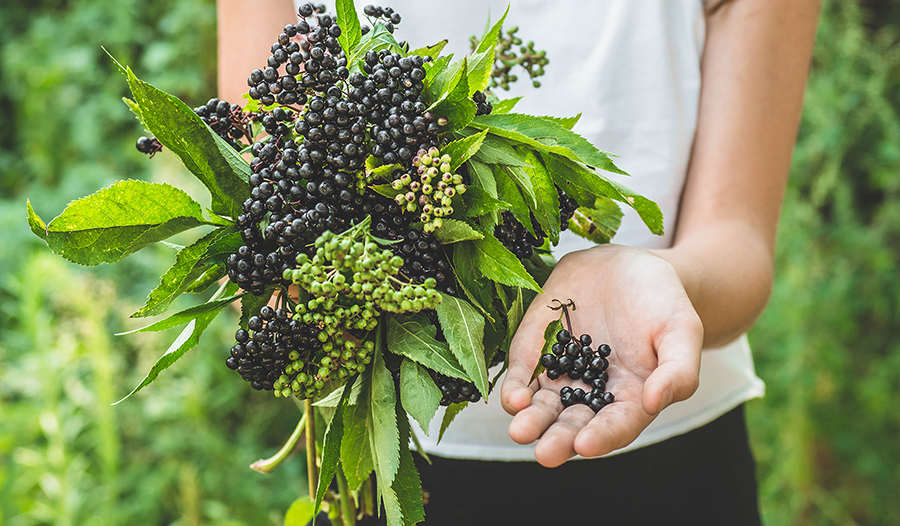Elderberry’s Powerful Immunity and Antiviral Benefits

What is Elderberry?
Elderberries are dark purple berries of the Sambucus tree, also commonly called “elder.” These berries have been used for thousands of years to support healing for viral upper respiratory infections such as the flu. The father of medicine, Hippocrates, referred to the elder tree as his "medicine chest."
In folklore and history, the elderberry tree was much more than just a fruit-bearing tree. In Northern Europe, an ancient Celtic tradition was to revere the elder trees, cherished as gifts from the “Elder Mother” goddess who was believed to reside inside the plant. In Scotland and Ireland, the plants were thought to protect forests and the people who cared for them. They were planted across Northern Europe to protect land, gardens, farms, and homes.
Fast forward centuries to our present world: this hearty plant is present in most, if not all, countries in the world and remains a plant utilized for its medicinal properties. It can be spotted growing wild in unlandscaped areas like in road ditches or near large cement barriers.
The Benefits of Elderberry on Immune Health
Elderflowers and berries are used throughout the world to help relieve the discomfort of cold and cough symptoms and to boost the immune system.
Though the berries look deceivingly sweet and juicy on the tree, they are not palatable to eat directly from the plant. In some cases, if not allowed to ripen, they can be poisonous. Cooking the elderberry removes any toxic properties, making it edible.
When heated, these semi-sweet berries become medicinal. They are not only rich in antioxidants such as vitamin C but have antimicrobial properties that boost immune health. The most important feature of the plant is the presence of compounds that physically block respiratory viruses from invading our cells.
Significant evidence shows elderberry’s direct anti-influenza viral activity. Elder blocks the receptor on our cells that the influenza virus uses to attach and attack. Animal research shows that elderberry is likely most effective in the prevention of, and early infection with respiratory viruses. For this reason, holistic-minded families often begin taking elderberry supplements daily in the early fall to prevent the flu and other viral respiratory illnesses.
Against the H1N1 influenza strain, elderberry syrup shows effectiveness comparable to Tamiflu. As an antioxidant, it helps scavenge and remove the leftovers of viral particles that penetrate our cells and cause dysfunction. This debris is also called free radicals and can cause symptoms like fever, cough, and achiness.
Viral Respiratory Infections and Elderberry
The Institute of Functional Medicine (IFM) supports the use of elderberry supplements for the prevention of respiratory viruses this season and respiratory and immune support during early infection. IFM has provided a detailed and convenient guide of natural therapies for a respiratory virus, which includes the supportive properties, uses, safety, and dosing of elderberry.
Some clinicians have expressed hesitation with using elderberry during more serious viral infections of the lungs because of the possibility of worsening symptoms by instigating an inflammatory process called a “cytokine storm.” Cytokines are inflammatory molecules released to help the body fight a foreign invader, but when released rapidly this “storm pattern” can cause worsening respiratory symptoms and possibly respiratory distress.
Only one study of commercially prepared elderberry, which may have had contaminants, showed a possible risk of inducing a cytokine storm. However, other studies of properly prepared elderberry supplements showed antiviral benefits and no evidence of inducing this process. The IFM states “these data suggest it is highly implausible that consumption of properly prepared elderberry products (from berries or flowers) would contribute to an adverse outcome related to overproduction of cytokines.”
How to Optimize Elderberry Supplementation
Elderberry for prevention of flu-like illness is taken daily when flu is prevalent. It complements the flu-fighting effect of vitamin D3. For higher-risk populations more likely to experience complications from flu-like illness (such as those with asthma, allergy, or other autoimmune and respiratory illnesses), taking elderberry syrup throughout the flu season as prevention likely will increase immune strength. Because of the high safety profile of the herb, healthy children and adults can take it to stay well during the fall and winter when multiple flu-like viruses can be a threat.
Many elderberry products are on the market, but the most common formulations are syrups or capsules. For younger children and people who do not swallow pills, the liquid is a good option; however, caution should be taken as many products have high sugar content. Sugar is a highly inflammatory food and will lower immune strength, the opposite of the desired health outcome of taking elderberry.
Children as young as 6 months of age can ingest low sugar liquid elderberry, although some people have used the product in younger children. Some products use local honey as the added sugar, to work as an anti-allergy benefit. However, the American Academy of Pediatrics advises avoiding honey in children under age one.
The optimal elderberry is a concentrated liquid with 2 grams of sugar per serving or less. All elderberry products should be organic to avoid pesticides. The best quality elderberry is wild harvest. Wild harvest elderberries grow wildly in nature without human intervention before harvest and are harvested with care in the best growing phase, optimizing sunlight and only removing a small percentage of the plant. With these low-stress conditions, wild harvest berries are likely to be more nutrient-dense, antioxidant-rich, and energetically healing.
Elderberry Dosage
Elderberry doses for older children and adults with active viral illness can be as high as two capsules four times a day depending on the product and concentration. For children under 4 years of age, a typical liquid dose during symptomatic illness is 1 teaspoon four times a day; and, for older children and adults, it is 2 teaspoons four times a day.
If taken as a preventative dose, elderberry is commonly taken daily as 1-2 teaspoons or one capsule, also depending on the concentration of the product. IFM recommends a standard adult dose of 500 mg by mouth every day (of USP standard of 17% anthocyanosides), so take the number of capsules or teaspoons that correlates with this dosage.
Now is the time to stock your cupboard with a fall immune-boosting regimen, so don’t forget the antiviral benefits of elderberry supplementation for you and your family.
References:
- Medical Herbalism: The science principles and practices of herbal medicine. Hoffmann, David. Rochester, Vt.: Healing Arts Press, 2003.
- Kinoshita E, Hayashi K, Katayama H, Hayashi T, Obata A. Anti-influenza virus effects of elderberry juice and its fractions. Biosci Biotechnol Biochem. 2012;76(9):1633-1638.
- Roschek B Jr, Fink RC, McMichael MD, Li D, Alberte RS. Elderberry flavonoids bind to and prevent H1N1 infection in vitro. Phytochemistry. 2009;70(10):1255-1261.
- The Institute of Functional Medicine. The Functional Medicine approach to Covid-19: Virus-specific nutraceutical and botanical agents. Updated April 7, 2020
- Barak V, Halperin T, Kalickman, I. The effect of Sambucol, a black elderberry-based, natural product, on the production of human cytokines: I. Inflammatory cytokines. Eur Cytokine Netw. 2001;12(2):290-296.
- Ramani T, Auletta CS, Weinstock D, et al. Cytokines: The good, the bad, and the deadly. Int J Toxicol. 2015;34(4):355-365.
- University of Sydney. (2019, April 23). Elderberry compounds could help minimize flu symptoms, study suggests. ScienceDaily. Retrieved October 15, 2020, from www.sciencedaily.com/releases/2019/04/190423133644.htm
DISCLAIMER:This Wellness Hub does not intend to provide diagnosis...
















































































 Table of Contents
Table of Contents


